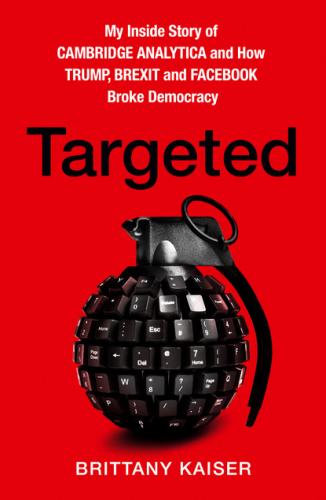The names of some characters have been changed to protect their privacy.
HarperCollinsPublishers
1 London Bridge Street
London SE1 9GF
First published by HarperCollinsPublishers 2019
FIRST EDITION
© Brittany Kaiser 2019
Cover layout design © HarperCollinsPublishers 2019
Cover photograph © Peter Dazeley/Getty Images
All photographs courtesy of the author unless marked otherwise
A catalogue record of this book is available from the British Library
Brittany Kaiser asserts the moral right to be identified as the author of this work
All rights reserved under International and Pan-American Copyright Conventions. By payment of the required fees, you have been granted the nonexclusive, non-transferable right to access and read the text of this e-book on screen. No part of this text may be reproduced, transmitted, downloaded, decompiled, reverse engineered, or stored in or introduced into any information storage retrieval system, in any form or by any means, whether electronic or mechanical, now known or hereinafter invented, without the express written permission of HarperCollins e-books.
Find out about HarperCollins and the environment at www.harpercollins.co.uk/green
Source ISBN: 9780008363895
Ebook Edition © October 2019 ISBN: 9780008363918
Version 2019-10-16
Information about External Hyperlinks in this ebook
Please note that footnotes and endnotes in this ebook may contain hyperlinks to external websites as part of bibliographic citations. These hyperlinks have not been activated by the publisher, who cannot verify the accuracy of these links beyond the date of publication.
To the Truth:
May it set us all free.
Contents
Copyright
Dedication
Prologue
1 A Late Lunch
2 Crossing Over
3 Power in Nigeria
4 Davos
5 Terms and Conditions
6 Meetings and Reunions
7 The Face of Brexit
8 Facebook
9 Persuasion
10 Under the Influence
11 Brexit Brittany
12 Straitjacket
13 Postmortem
14 Bombs
15 Quake
16 Breakup
17 Inquiry
18 Restart
19 Of Truth and Consequences
20 The Road to Redemption
Epilogue
Picture Section
Acknowledgments
Notes
About the Publisher
There’s nothing like a car ride with federal agents to make you question your life choices. That was exactly where I found myself the morning of July 18, 2018, winding through the streets of Washington, DC, heading toward an interview with Special Counsel Robert Mueller’s investigators.
My trip that morning consisted of riding in two cars, actually—the first took me to a coffee shop that the Department of Justice had randomly selected. This had been the driver’s instructions when I initially slid into the backseat: they had chosen a place unexpectedly, without planning it out or telling anyone beforehand. Then, once we were on our way, he was to radio in our destination. At the coffee shop, the second driver was waiting. Like the first driver, he was wearing a dark suit and dark glasses, but there was a second man with him as well. From the second car—outfitted like the first with tinted windows—I watched as the city’s gleaming monuments, bright and sudden and very white, flashed by us like camera bulbs.
When I was settled in the backseat between my two attorneys, it was hard not to consider just how I’d ended up here, on my way to talk to federal prosecutors about my role with the now-infamous political communications firm, Cambridge Analytica. How a situation that I’d entered with the best of intentions for me and my family had ended up so horribly and irrevocably twisted. How in the process of wanting to learn how to use data for good, and while helping my parents through a difficult financial moment, I’d ended up compromising my political and personal values. How a mixture of naïveté and ambition had landed me squarely and disturbingly on the wrong side of history.
A little more than three and a half years earlier, I’d joined Cambridge Analytica’s parent company, the SCL Group—specifically, their humanitarian division, SCL Social—working on projects under the company’s CEO, a man named Alexander Nix. In the years since that leap of faith, nothing had gone as I’d envisioned it. As a lifelong Democrat and devoted activist who had worked for years in support of progressive causes, I had started my work with Cambridge Analytica under the pretense that I would be separate from the company’s Republican client base and outreach. It didn’t take long, though, to find myself gradually pulled away from my principles by the difficulty of securing funding for humanitarian projects and the allure of success on the other side. At Cambridge Analytica there was the promise of real money for the first time in my career, and a way to buy into the vision that I was helping to build a revolutionary political communications company from the ground up.
In the process, I had been exposed to the vast sweep of Cambridge’s efforts, both to acquire data on as many U.S. citizens as possible and to leverage that data to influence Americans’ voting behavior. I’d also come to see how Facebook’s negligent privacy policies and the federal government’s total lack of oversight about personal data had enabled
